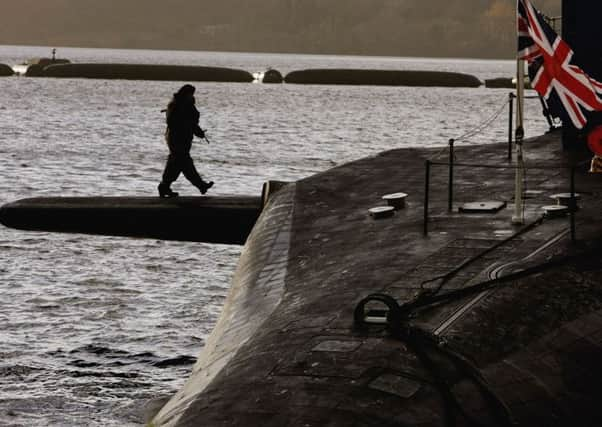Trident removal may allow oil and gas exploration


Energy minister Fergus Ewing yesterday insisted Scotland would not have any “no-go areas” for drilling, after it emerged the Ministry of Defence had blocked the prospect of a second oil boom in the Firth of Clyde post-independence.
BP undertook seismic surveys south of Arran and east of Kintyre in the early 1980s, but concerns emerged that these could interfere with naval operations in the area, notably by the Trident nuclear-armed submarines based at Faslane on the Clyde.
Advertisement
Hide AdAdvertisement
Hide AdThe Scottish Government has said it is committed to removing Trident within two years of a Yes vote.
Mr Ewing has now confirmed he is ready to look at the oil and gas potential in the Firth of Clyde, in response to questions from a local businessman who wrote to him on the issue.
“If there are exploration opportunities off Scotland’s shores then it is clear that these should be fully considered and encouraged where appropriate to do so,” he told Norman Geddes, managing partner at Frazer Coogans Commercial Solicitors in Ayr. “All proposals for exploration will be considered on their individual merits, and I would reiterate that there will be no ‘no-go’ areas for exploration in Scottish waters.”
Mr Geddes said: “If oil and gas are discovered off our coastline in recoverable quantities, it would transform the economy of Ayrshire and south-west Scotland, and also provide a significant boost to the prosperity of Scotland as a whole.”
The MoD is reported to remain “very strongly opposed to any drilling”, on the grounds an exploration programme would potentially cause problems to the Trident fleet.
Scotland’s Future, the SNP Scottish Government’s white paper on independence, has confirmed nuclear weapons will be removed from the Scotland’s waters after independence.
But Faslane would be the HQ of the proposed Scottish Defence Force, and there would probably still be activity from ships and submarines based there.
Declassified government papers recently showed the MoD had objected to BP installing drilling rigs in the seas just south of Arran over fears it would interfere with a training and exercise area for nuclear submarines.
Advertisement
Hide AdAdvertisement
Hide AdThat blocked any test drilling which would have established the extent of reserves in the area, but in 1983 the then Scottish secretary, George Younger, said oil firms were “expecting something exploitable” in the area.
Chic Brodie, an SNP MSP for South Scotland, has campaigned on the issue. He said: “If ever there was an example of Westminster not having Scotland’s best interests at heart, then it is right here in the Firth of Clyde where Scotland is landed with Trident nuclear weapons and denied the right to utilise our vast natural resources.
“There is compelling evidence Scotland has oil and gas potential in the waters south of Arran but, due to a failed, botched cover-up job by the MoD and Westminster, access to these resources was halted on safety grounds.”
A spokeswoman for industry body Oil and Gas UK said: “Both the UK and Scottish governments recognise the importance of the UK oil and gas industry and they share a vision to maximise economic recovery of our oil and gas resources.
“However, we will not speculate on matters relating to independence: ultimately it is not for us but the Scottish public to decide.”
The oil and gas industry is at the heart of the SNP’s plans for independence.
In a paper earlier this year, it stated: “We will create the conditions to develop new technology, providing the means to maximise the recovery of remaining resources, particularly those in smaller and more challenging fields.”
An estimated 24 billion barrels of oil and gas remain in then North Sea, with a wholesale value of about £1.5 trillion. The North Sea has contributed approximately £300 billion in tax receipts, at 2012-13 prices, to the UK Exchequer since drilling got under way in the 1970s.
In 2012, oil and gas production was estimated to have contributed about £22bn to Scotland’s GDP.
Some 200,000 people are employed directly or indirectly in the sector across Scotland.